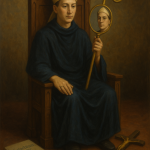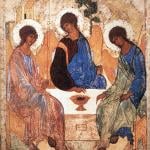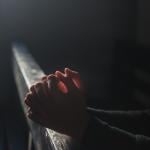Last updated on: December 15, 2016 at 10:05 am
By
CNA Daily News
Washington D.C., Dec 15, 2016 / 03:05 am (CNA/EWTN News).- You might have seen an Army chaplain devoutly praying the rosary on the sideline during Saturday's Army-Navy football game. Who was he and what was he praying for? “I always pray for both our teams, for no serious injury on either team. And I pray for the kids on both teams, and just for their holiness and their salvation,” Fr. Matthew Pawlikowski, chaplain of the United States Military Academy at West Point, told CNA. “And then I ask for Army's victory,” he added. Saturday's Army-Navy game was the 117th meeting between the teams, held at Baltimore's M&T Bank Stadium. It is an annual tradition attended by Midshipmen and Cadets who will serve in the United States military after college. Army won for the first time in 15 years, 21-17. Fr. Pawlikowski was seen kneeling on the sideline late in the game during its crucial moments praying a rosary. He noted that he always prays a rosary at the academy's football games, but at Saturday's game against Navy he prayed a full rosary, all four sets of mysteries. After the game, he admitted that he prayed for the defeated Navy players too. Why the West Point chaplain was kneeling with his Rosary during the Army-Navy game... - https://t.co/sBRmV1IDlM — New Advent (@newadvent) December 12, 2016 “I was glad that we won, but I did pray for Navy, and especially for their seniors, their 'Firsties.' They wanted to win just as much as we do,” he said. “So what if they've won 14 years in a row? That senior class, it's important to them to beat Army.” While he has been the senior chaplain at West Point for two years – the first Catholic to hold the position – Fr. Pawlikowski has actually been serving as an active-duty Army chaplain since 2000. “I love being a priest. And I love being a priest for soldiers. It is a great life. It's a manly life. It's satisfying,” he told CNA. The youngest of seven children, he grew up Catholic and considered the priesthood in high school before attending college at West Point. He served in the Army infantry for six years and entered the seminary for the Diocese of Newark after his time there. After three years as a parish priest, he became an active-duty Army chaplain in 2000. His assignments have brought him around the U.S. and to Egypt, Afghanistan, and Germany. Now, at West Point, “I supervise the entire religious program for the commanding general of the post,” he said. What are some of the unique joys and challenges of being a military chaplain? Fr. Pawlikowski likened it to “being a missionary,” given that there is a “military subculture” within society. Just as one can’t fully understand the Catholic Church from an outsider’s perspective, the military is the “same way,” he said. “American soldiers are awesome,” he said. “We have these young people that step forward at risk of themselves, at risk of their own safety, their family’s safety, and they do things to protect the rest of the country, to serve the country.” “They don’t get paid what they’re worth,” he added. “There’s really a sense of service about them, which is absolutely beautiful.” And it is “pretty much a large young adult ministry,” he noted, as many soldiers are ages 18 to 24. At West Point in particular, Fr. Pawlikowski realizes that as senior chaplain, he is forming the future leaders of the country. “We’re shaping them who end up shaping our country,” he said. “God can use the United States military for the holiness of our country and even for the salvation of our country. So that’s not a bad job to have.” However, it is a “missionary” life as many young cadets may not even be practicing their faith. “Most young males are away from the Church. And that’s most of our soldiers,” he said, noting increasing numbers of young people who are Atheists, secularists, or “unchurched” Christians. Yet among those who are practicing Catholics, he noted, “I am seeing what Pope Benedict XVI predicted. He said that in our lifetime, we are going to see a smaller and yet more vibrant Church.” “The folks that are zealous are amazing. They are so far ahead of me and where I was at their age,” he said, describing them as “knowledgeable,” “devout,” “pious,” and “respectful.” Military chaplains have to minister to soldiers anywhere – at the gym, at work, or out in the field training. They have to be in “good physical shape” and “learn how to operate in a combat environment,” Fr. Pawlikowski said, “so that we can be there for those people when they need it.” How does he normally evangelize? “We give witness to the faith, first and foremost, by who we are,” Fr. Pawlikowski said, noting that “when soldiers see that you’re there with them” in “rotten” conditions in rain, snow, and freezing weather, “then they see that you’re one of them…that’s the beauty of the chaplaincy.” “A lot of the military chaplaincy is geared specifically to that, that we should never have any of our young Americans who are willing to risk their lives for our safety and our security have to face death, or at least the threat of death, without the presence of the sacraments available to them. And the presence of one of God’s priests available to them,” he said. He keeps a picture – on the back of his prayer book and over his altar – of a priest friend of his administering the sacrament of Extreme Unction to a bloody-faced Marine on a table waiting to be operated on. It’s like Christ as the Good Samaritan, he said, who “comes into the midst of the messiness” to heal those broken by the world and by sin. Who are some of his favorite saints and what are his favorite devotions? Fr. Pawlikowski considers his “secondary vocation” to promote the story of Servant of God Fr. Emil Kapaun, who ministered to troops in the U.S. Army Eighth Cavalry Regiment during the war in Korea. He wrote letters home for wounded soldiers to their families. Fr. Emil was captured by Chinese troops, and as a prisoner of war he administered the sacraments to fellow prisoners. He died in the prisoner of war camp in 1951, and his cause for beatification is under review. Other saints who Fr. Pawlikowski promotes are those who had a military background like St. Joan of Arc, St. Ignatius of Loyola, St. Maurice, and St. Sebastian. He has had a devotion to St. Michael “since before I can remember.” “I’m consecrated to the Blessed Mother. I love her dearly, I love the rosary,” he added, noting that it’s a “battle prayer” as Mary is the new Ark of the Covenant that we bring with us into spiritual battle. And what of his praying for an Army victory on Saturday? “There’s not a thing in the world that God doesn’t care about,” he said. “I don’t think it’s immature to think that God really does care in ways that we can’t begin to understand. So I always tell people you can ask God for anything you want – you can’t ask for evil and He won’t give you evil.” “But anything that’s important to you is important to God, He’s your father. What father is not concerned about anything his children ask for?” he said. “Now a good father doesn’t give us everything we ask for. And part of growing up is learning to realize ‘hey, if my father gives it to me, it’s good. And if he doesn’t, he’s got his reasons.’” “But we can certainly ask, and I certainly did ask. I don’t think there’s anything wrong with that.” Read more













